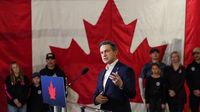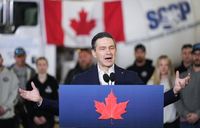Pierre Poilievre has come to the defense of Aaron Gunn, a Conservative candidate for North Island–Powell River in British Columbia, amid mounting calls for Gunn's withdrawal due to his controversial comments regarding the history of Indigenous residential schools in Canada. Critics have accused Gunn of downplaying the severity of these institutions, which forcibly removed over 150,000 First Nations, Métis, and Inuit children from their families between 1870 and 1997.
During a press conference held in Osoyoos, British Columbia, Poilievre asserted that the letter sent to the Conservative Party requesting Gunn's removal was based on misinformation. He emphasized that Gunn has not denied the impact of residential schools, stating, "He wants to condemn the government-sponsored system that removed over 150,000 Indigenous children from their families, with the last establishment closing in 1996." Poilievre further claimed that Gunn aims to establish stronger partnerships with First Nations to unlock resources and create job opportunities for Indigenous communities.
Gunn's posts on X (formerly Twitter) have stirred significant controversy. In 2020 and 2021, he argued that the residential school system did not constitute genocide and referred to these schools as "very slandered." His comments have drawn sharp criticism from Indigenous leaders and groups, including the Union of B.C. Indian Chiefs and the B.C. Assembly of First Nations, who have demanded his dismissal from the Conservative candidacy.
In a statement on X, Gunn defended his position, saying, "I have always been firm in my recognition of the horrors that occurred in residential schools, and any attempt to suggest otherwise is simply false." His remarks come against the backdrop of a historical reckoning in Canada regarding the treatment of Indigenous peoples.
The Truth and Reconciliation Commission of Canada, which investigated the residential school system, concluded that these institutions were sites of numerous abuses, where children were often separated from their families and deprived of visits. The Commission's final report labeled the residential school system as a tool of cultural genocide, aimed at the systematic destruction of Indigenous cultures and languages.
In 2022, the House of Commons unanimously passed a motion recognizing Canadian residential schools as instruments of genocide, a sentiment echoed by Pope Francis during his visit to Canada that same year. He described the experiences of Indigenous peoples in these schools as a "genocide." Such statements have intensified the scrutiny surrounding candidates like Gunn, who have made controversial remarks about this dark chapter in Canadian history.
As political parties prepare for the upcoming election, they have until Monday, April 7, 2025, to formalize their candidacies. Poll aggregator 338 Canada currently shows Gunn leading the race in North Island–Powell River, which adds to the urgency of the situation.
In a broader context, the Conservative Party has faced its share of controversies in recent days. Liberal candidate Thomas Keeper was dropped from his party after assault charges against his ex-wife resurfaced, and Paul Chiang resigned after suggesting he would turn a Conservative rival over to Chinese authorities. Meanwhile, the Conservatives dismissed two candidates for making inappropriate remarks, one concerning public executions and the other related to conspiracy theories.
In light of these events, Poilievre has positioned the Conservative Party as the only political entity capable of offering a promising future for Indigenous peoples through resource development. He stated, "A Conservative government wants to unlock opportunities for our economy and ensure that First Nations communities are the first to benefit from it." This rhetoric aims to resonate with voters who seek a more prosperous future for Indigenous communities.
The ongoing discourse surrounding Gunn's candidacy reflects a deeper struggle within Canadian politics about how to address the historical injustices faced by Indigenous peoples. With the Conservative Party's focus on resource development and partnerships with First Nations, the outcome of the North Island–Powell River race could have significant implications for Indigenous relations in Canada.
As the election approaches, the tension between acknowledging past atrocities and the political ambitions of candidates like Gunn will likely continue to spark debate. The Conservative Party is under pressure to navigate these sensitive discussions while maintaining its electoral viability.
In conclusion, the situation surrounding Aaron Gunn serves as a reminder of the complexities involved in Canadian politics, particularly regarding Indigenous issues. As leaders like Pierre Poilievre defend candidates with controversial views, the broader implications for reconciliation and cultural recognition remain at the forefront of public discourse.





